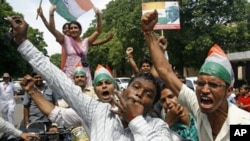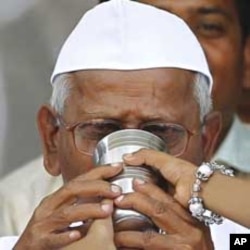In India, the civil society movement that forced parliament to back activist Anna Hazare’s demand for tougher anti-corruption legislation is being seen as a new force in Indian politics.
As the 74-year-old self-styled Gandhian reformer ended a 13-day hunger strike in New Delhi on Sunday, he acknowledged that it was the support of tens of thousands of people across the country that ensured success for his campaign for a powerful anti corruption law.
Hazare told jubilant crowds that people’s parliament is bigger than Delhi’s parliament, and that is why the government had to decide in favor of their demands.
The domestic media too has widely hailed it as a “people’s victory.”
The peaceful movement led by Hazare was joined by people of all ages. And for the first time in decades it saw the urban middle class emerge spontaneously on the streets in huge numbers for a political cause.
Photo gallery of Anna Hazare's movement
Social activists hope this will ensure a tougher law in place of a weaker version presented by the government.
Independent political analyst Prem Shankar Jha in New Delhi says the success of the anti-corruption movement marks a turning point in Indian democracy.
“We had a paternalistic government handed down to us from the imperial days …we draft a bill and we pass the bill, we never consult with you, we never bring any outsiders in," says Jha. "We want to do everything ourselves… which means we want to keep power in our hands. This total monopoly of power masquerading as paternalism has been smashed. In this particular occasion, the government was forced in parliament to approve the key elements of the people’s draft. Now that is the end of paternalistic government in India and the beginning of real empowered democracy.”
The political class, which analysts say was taken aback by the strength of the movement, appears to be heeding that message. Leader of the opposition Bharatiya Janata Party, Arun Jaitley, told parliament that people’s voices will have to be heard while framing legislation.
“In any developing society and any mature society, there will be a role for civil society," he said. "They are a hard reality, they will exist. Some of them may take positions which seem a little excessive, they may not be implementable, but we must realize that their role is one of a campaigner, a flag bearer, a crusader on several issues.”
Hazare’s movement and use of a hunger strike to achieve his aim has its critics. Some say it has set a dangerous precedent. Others say he used undemocratic methods to force his views on parliament.
Hazare has announced his focus on reforming the political system will continue.
In a country where scores of lawmakers face criminal charges, he wants to ensure that people with a clean record are elected to parliament and state legislatures. He says people should be given the right to recall lawmakers who do not perform.
But political analyst Jha says he does not expect Hazare and his supporters to use the same tactics in the future.
“I do not think they will use the confrontation route. This is a stick that can break very easily in your hands. It should be kept for an absolute emergency as it was now,” he says.
Political analysts say the recent protest highlighted that the political class was largely out of touch with the public’s concern over deep-seated corruption. They say the protest’s success will force officials to pay closer attention to public opinion.





